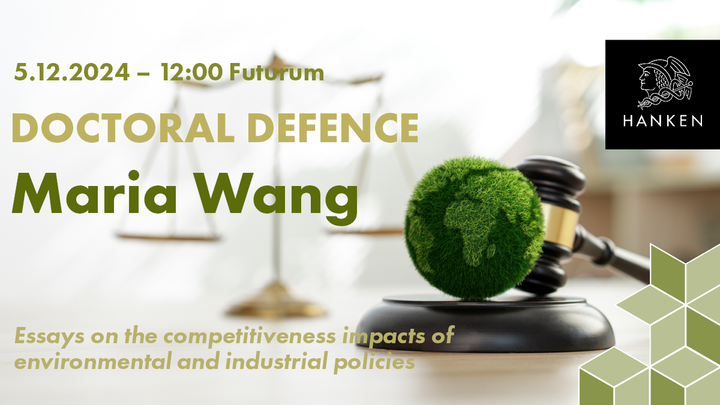New research shows that EU Emissions Trading-related subsidies should be re-evaluated
2.12.2024 11:13:09 EET | Svenska handelshögskolan | Press release
Doctoral defence 5.12.2024: Finland has implemented a subsidy scheme to compensate industrial producers for the indirect costs of the emissions trading system. Maria Wang shows in her dissertation that the subsidy has not been optimally designed. Its recipients are mostly large companies that do not suffer from the increase in electricity costs caused by emissions trading.

In her dissertation, Maria Wang examines the economic impacts of the EU emissions trading system and a subsidy policy designed to compensate producers operating in the EU for the system’s costs.
To reduce the risk of carbon leakage, several EU countries have introduced a compensation subsidy for indirect costs under emissions trading, designed to cover the costs of increased electricity prices for production facilities. Finland is one of the ten countries to implement this system. Wang has evaluated the effectiveness of the subsidy in Finnish industry during the years 2016–2019.
The results do not show improvements in the competitiveness of the subsidy recipients.
"The recipients of the subsidy are in most cases large companies that do not suffer from the increase in electricity costs caused by emissions trading. Some of them even produce and sell their own electricity," Wang says. In Wang’s opinion, this raises questions about the usefulness of the subsidy.
"The subsidy has good intentions, but it has not been optimally designed. My results suggest that policymakers should evaluate how these subsidies are applied to ensure they are genuinely useful—or whether they are necessary at all."
The EU emissions trading system (EU ETS) sets a cap on emissions for several emission-intensive sectors, such as manufacturing and aviation, but allows companies to trade emission allowances. To lessen the negative impacts on producers, the EU has introduced the cost compensation subsidy. The subsidy is justified by the fact that the costs arising from emissions trading may weaken the EU’s competitiveness and lead to carbon leakage, where companies relocate production to areas with less stringent environmental regulations.
Although carbon leakage has not been a significant concern in the EU, there is evidence that some companies may relocate their production sites due to the costs of emissions trading.
Wang states that carbon leakage is a concern, especially as the system tightens over time.
"However, overall EU emissions have decreased, and competitiveness has not been significantly harmed by emissions trading."
More information (also in English):
Maria Wang
Phone: 040 741 0270
Email: maria.wang@hanken.fi
You can read the whole thesis online:
Essays on the competitiveness impacts of environmental and industrial policies
Maria Wang will defend her thesis on 5 December at 12:00 at Hanken School of Economics, Arkadiankatu 22, Helsinki.
The doctoral defence will be held as hybrid. Participants can attend on site or via video conference. Access the video conference via Teams. https://go.hanken.fi/defence-wang
Opponent: Professor Jurate Jaraite-Kazukauske, Vilnius University
Custos: Professor Rune Stenbacka, Hanken School of Economics
Contacts
Marlene GünsbergSenior Communications Specialist
Tel:040 3521212marlene.gunsberg@hanken.fiAbout
Hanken School of Economics is a leading, internationally accredited university with over a hundred years of experience in education and research in economics and business administration. The research is of a high standard and constitutes the foundation of all teaching. Hanken has close ties to the business community and an active alumni network with over 13 000 alumni in 65 countries worldwide.
Alternative languages
Subscribe to releases from Svenska handelshögskolan
Subscribe to all the latest releases from Svenska handelshögskolan by registering your e-mail address below. You can unsubscribe at any time.
Latest releases from Svenska handelshögskolan
Hankens rektor Ingmar Björkmans mandat förlängs2.2.2026 16:39:42 EET | Pressmeddelande
Svenska handelshögskolans (Hanken) styrelse utser rektor för högst fem år i sänder. Styrelsen har i sitt möte 2.2.2026 beslutat att nuvarande rektor Ingmar Björkmans mandat, vars femårsperiod tar slut 31.7.2027, förlängs med ett år till 31.7.2028. Enligt gällande pensionsregler måste Björkman gå i pension hösten 2028.
Hankenin rehtori Ingmar Björkmanin toimikautta jatketaan2.2.2026 16:39:42 EET | Tiedote
Kauppakorkeakoulu Hankenin hallitus nimittää rehtorin enintään viideksi vuodeksi kerrallaan. Hallitus päätti kokouksessaan 2.2.2026, että nykyisen rehtorin Ingmar Björkmanin toimikautta, joka päättyy 31.7.2027, jatketaan yhdellä vuodella 31.7.2028 saakka. Voimassa olevien sääntöjen mukaan Björkmanin tulee jäädä eläkkeelle syksyllä 2028.
Hanken’s Rector Ingmar Björkman’s term extended2.2.2026 16:39:42 EET | Press release
The Board of Hanken School of Economics appoints the rector for a maximum of five years at a time. At its meeting on 2 February 2026, the Board decided that the current Rector, Ingmar Björkman, whose five-year term ends on 31 July 2027, will have his mandate extended by one year until 31 July 2028. According to current retirement regulations, Björkman retires in the autumn of 2028.
Ny forskning visar att konflikterna kring samiskhet i Finland har drivits fram medvetet27.1.2026 12:41:52 EET | Pressmeddelande
Många kommuner, politiska partier, regionala utvecklingsorganisationer och ekonomiska intresseorganisationer i Lappland har gett stöd åt motmobilisering mot Sametinget i Finland och åt ett nytt identitetsprojekt kopplat till lokala och regionala ekonomiska intressen.
Uusi tutkimus viittaa siihen, että saamelaisuuteen liittyviä kiistoja Suomessa tuettiin tarkoituksella27.1.2026 12:41:52 EET | Tiedote
Monet kunnat, poliittiset puolueet, aluekehitysorganisaatiot ja elinkeinoelämän edunvalvonnan järjestöt ovat tukeneet liikehdintää saamelaiskäräjiä vastaan ja uutta identiteettiprojektia, jolla on paikallisalueellisia taloudellisia intressejä.
In our pressroom you can read all our latest releases, find our press contacts, images, documents and other relevant information about us.
Visit our pressroom